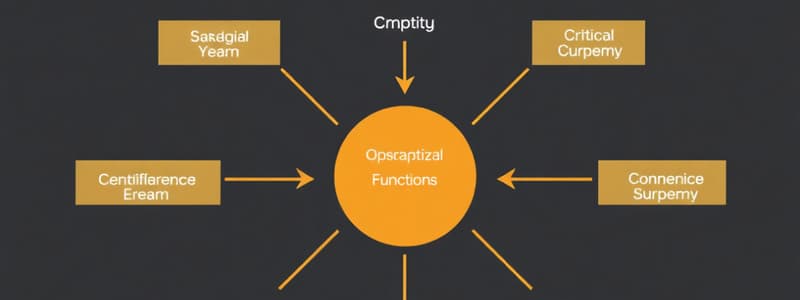Podcast
Questions and Answers
Which of the following is NOT one of the management functions represented by P-O-L-C?
Which of the following is NOT one of the management functions represented by P-O-L-C?
- Leadership (correct)
- Controlling
- Planning
- Organizing
Which managerial level is primarily responsible for controlling day-to-day operations?
Which managerial level is primarily responsible for controlling day-to-day operations?
- Top Managers
- First-Line Managers (correct)
- Team Leaders
- Middle Managers
What does the concept of synergy in an organization refer to?
What does the concept of synergy in an organization refer to?
- Collaboration that produces greater outcomes (correct)
- The sum of individual contributions
- Individual work without interdependence
- Independent functioning of team members
Which of the following strategies assesses an organization's competitiveness?
Which of the following strategies assesses an organization's competitiveness?
What is the primary focus of the behavioral viewpoint in management?
What is the primary focus of the behavioral viewpoint in management?
In SWOT analysis, what does 'O' stand for?
In SWOT analysis, what does 'O' stand for?
Which of the following is NOT a factor analyzed in the PESTLE framework?
Which of the following is NOT a factor analyzed in the PESTLE framework?
What role does a spokesperson play in management functions?
What role does a spokesperson play in management functions?
Flashcards
What are the four core functions of management?
What are the four core functions of management?
The four core functions of management encompass planning, organizing, leading, and controlling. This framework helps managers allocate resources, coordinate efforts, and ensure that work is performed effectively and efficiently.
What is the difference between an open and closed system in organizational theory?
What is the difference between an open and closed system in organizational theory?
Organizations can be viewed as open systems that interact with their environments, exchanging resources and information. They take in inputs, transform them, and create outputs. Closed systems are isolated and do not interact with their surroundings.
What is synergy in a system?
What is synergy in a system?
Synergy in a system refers to the combined effect of multiple elements working together that is greater than the sum of their individual contributions. By effectively integrating different parts of the organization, synergy allows for enhanced performance and outcomes.
What is the behavioral viewpoint in management?
What is the behavioral viewpoint in management?
Signup and view all the flashcards
What is a SWOT analysis?
What is a SWOT analysis?
Signup and view all the flashcards
What is a PESTLE analysis?
What is a PESTLE analysis?
Signup and view all the flashcards
What are Porter's Five Forces?
What are Porter's Five Forces?
Signup and view all the flashcards
What is VRIO analysis?
What is VRIO analysis?
Signup and view all the flashcards
Study Notes
Management and Managers
- Management Functions: Planning, Organizing, Leading, Controlling (POLC)
- Management Levels: Top Managers, Middle Managers, First-Line Managers, Team Leaders, Non-managerial Employees
- Managerial Roles: Interpersonal (figurehead, leader), Informational (spokesperson, disseminator, monitor), Decisional (negotiator, entrepreneur)
- Efficiency vs Effectiveness: Efficiency is resource utilization; effectiveness is goal achievement. A manager can be efficient but ineffective (using resources well for the wrong goal) or ineffective but efficient (using resources poorly for the right goal).
- Managerial Skills: Conceptual (analyzing situations and cause-effect), Human (understanding, leading others), Technical (job-specific knowledge/techniques)
- Core Competency: Unique skills, knowledge, and experience of an organization that makes it outperform others.
- Managerial Challenges: Managing for competitive advantage, technological advances, inclusion and diversity, globalization, ethical standards, sustainable development, happiness and meaningfulness
Management Theories
- Scientific Management (Frederick Taylor): Systematic study of task-person interactions for efficiency improvement.
- Taylor's Four Principles: Study work, codify procedures, select and train employees, reward performance.
Administrative Management (Max Weber):
- Bureaucracy Principles: System of organization with formal authority, hierarchical structure, and strict rules.
Behavioral Viewpoint of Management
- Hawthorne Studies: Experiments on worker fatigue and performance, revealing social/psychological factors in work.
- Early Behaviorism (Munsterberg): Identifying best people for jobs, optimal psychological conditions, influence methods.
- Mary Parker Follett: Emphasized horizontal communication and knowledge-based authority.
Quantitative Approaches
- The text does not provide detailed information on quantitative approaches to solving problems.
Systems View of Management
- Open vs Closed Systems: Open systems interact with the environment; closed systems do not.
- Synergy: Combined effect greater than individual efforts.
- Feedback: Information about reactions to outputs affecting inputs.
- Inputs, Transformations, Outputs, Feedback: The process of using inputs, transforming them via organizational capabilities, producing outputs, receiving environmental feedback.
Strategic Management
- SWOT Analysis: Strengths, Weaknesses, Opportunities, Threats.
- PESTLE Analysis: Political, Economic, Sociological, Technological, Legal, Environmental factors
- Five Forces Model: Threat of new entrants, threat of substitute products, rivalry among existing firms, bargaining power of suppliers, bargaining power of buyers.
- VRIO Framework: Value, Rarity, Imitability, Organization (competitive advantage framework).
- BCG Matrix: Corporate portfolio analysis, categorizing products as Stars, Question Marks, Cash Cows, Dogs based on market growth/share.
- Corporate-level Strategy: Deciding which businesses to be in.
- Business-Level Strategy: Competitive strategies within an industry.
- Functional-level Strategy: Supporting the business-level strategy within functions like marketing, operations.
- Strategic Management Process: Mission, vision, assessment, strategy formulation, implementation, control
Control
- Six reasons for control: adapt to change, discover errors, reduce costs, detect opportunities, provide feedback, decentralise decision-making, facilitate teamwork.
- Three Types of Control: Feedforward, Concurrent, Feedback
- Balanced Scorecard: Measures organizational performance from four perspectives: Customer, Financial, Internal Business, Learning & Growth.
Organizational Structure & Culture
- Organizational Structure Features: Common purpose, coordinated effort, division of labour, hierarchy of authority, span of control.
- Centralization vs Decentralization: Centralized decision-making vs distributed decision-making.
- Organizational Culture Levels: Observable artefacts, espoused values, underlying assumptions.
- Four Types of Culture: Clan (internal/flexible), Adhocracy (external/flexible), Market (external/controlled), Hierarchy.
Organizational Development (OD)
- How OD Works: Diagnosis, Intervention, Evaluation, Feedback
- Ten Reasons for Resistance to Change: Predisposition to change, surprise, fear of the unknown, climate of mistruths, fear of failure, loss of status, disruption of culture, peer pressure, lack of tact, non-reinforcing reward systems.
Studying That Suits You
Use AI to generate personalized quizzes and flashcards to suit your learning preferences.




